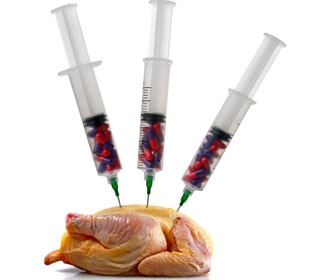Pharming
By John Scales Avery
04 January, 2016
Countercurrents.org

A major global public health crisis may soon be produced by the wholesale use of antibiotics in the food of healthy farm animals. The resistance factors produced by shoveling antibiotics into animal food produces resistance factors (plasmids) which can easily be transferred to human pathogens. A related problem is the excessive use of pesticides and artificial fossil-fuel-derived fertilizers in agriculture. Pharming is not a joke. It is a serious threat.
http://ecowatch.com/2014/03/06/misuse-antibiotics-fatal-superbug-crisis/
http://ecowatch.com/2013/12/06/8-scary-facts-about-antibiotic-resistance/
http://ecowatch.com/2015/03/27/obama-fight-superbug-crisis/
http://ecowatch.com/2014/03/12/fda-regulation-antibiotics-factory-farms/
http://www.bbc.com/news/health-35153795
http://www.bbc.com/news/health-21702647
http://www.bbc.com/news/health-34857015
http://sustainableagriculture.net/about-us/
https://pwccc.wordpress.com/programa/
Plasmids
Bacteria belong to a class of organisms (prokaryotes) whose cells do not have a nucleus. Instead, the DNA of the bacterial chromosome is arranged in a large loop. In the early 1950's, Joshua Lederberg had discovered that bacteria can exchange genetic information. He found that a frequently-exchanged gene, the F-factor (which conferred fertility), was not linked to other bacterial genes; and he deduced that the DNA of the F-factor was not physically a part of the main bacterial chromosome. In 1952, Lederberg coined the word ``plasmid" to denote any extrachromosomal genetic system.
In 1959, it was discovered in Japan that genes for resistance to antibiotics can be exchanged between bacteria; and the name “R-factors”was given to these genes. Like the F-factors, the R-factors did not seem to be part of the main loop of bacterial DNA.
Because of the medical implications of this discovery, much attention was focused on the R-factors. It was found that they were plasmids, small loops of DNA existing inside the bacterial cell, but not attached to the bacterial chromosome. Further study showed that, in general, between one percent and three percent of bacterial genetic information is carried by plasmids, which can be exchanged freely even between different species of bacteria.
In the words of the microbiologist, Richard Novick, “Appreciation of the role of plasmids has produced a rather dramatic shift in biologists' thinking about genetics. The traditional view was that the genetic makeup of a species was about the same from one cell to another, and was constant over long periods of time. Now a significant proportion of genetic traits are known to be variable (present in some individual cells or strains, absent in others), labile (subject to frequent loss or gain) and mobile, all because those traits are associated with plasmids or other atypical genetic systems.”
Pesticides, artificial fertilizers and topsoil
A very serious problem with Green Revolution plant varieties is that they require heavy inputs of pesticides, fertilizers and irrigation. Because of this, the use of high-yield varieties contributes to social inequality, since only rich farmers can afford the necessary inputs. Monocultures, such as the Green Revolution varieties may also prove to be vulnerable to future plant diseases, such as the epidemic that caused the Irish Potato Famine in 1845. Even more importantly, pesticides, fertilizers and irrigation all depend on then use of fossil fuels. One must ask, therefore, whether high-yield agriculture can be maintained in the post-fossil-fuel era.
Topsoil is degraded by excessive use of pesticides and artificial fertilizers. Natural topsoil is rich in organic material, which contains sequestered carbon that would otherwise be present in our atmosphere in the form of greenhouse gases. In addition, natural topsoil contains an extraordinarily rich diversity of bacteria and worms that act to convert agricultural wastes from one year's harvest into nutrients for the growth of next year's crop. Pesticides kill these vital organisms, and make the use of artificial fertilizers necessary.
Finally, many small individual farmers, whose methods are sustainable, are being eliminated by secret land-grabs or put out of business because they cannot compete with unsustainable high-yield agriculture. Traditional agriculture contains a wealth of knowledge, which it would be wise for the world to preserve.
John Avery received a B.Sc. in theoretical physics from MIT and an M.Sc. from the University of Chicago. He later studied theoretical chemistry at the University of London, and was awarded a Ph.D. there in 1965. He is now Lektor Emeritus, Associate Professor, at the Department of Chemistry, University of Copenhagen. Fellowships, memberships in societies: Since 1990 he has been the Contact Person in Denmark for Pugwash Conferences on Science and World Affairs. In 1995, this group received the Nobel Peace Prize for their efforts. He was the Member of the Danish Peace Commission of 1998. Technical Advisor, World Health Organization, Regional Office for Europe (1988- 1997). Chairman of the Danish Peace Academy, April 2004. http://www.fredsakademiet.dk/ordbog/aord/a220.htm. He can be reached at [email protected]

